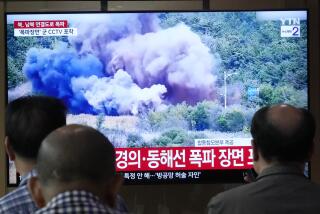Morale Sinking for North Koreans Bordering China
- Share via
HUSHAN, Chinese-North Korean border — From out of a thicket of reeds, a foot emerges in a torn canvas sneaker. It belongs to a North Korean border guard who, after a few moments’ shyness, rolls his khaki trousers to the knees and wades across a muddy stretch of the Yalu River separating China from North Korea.
Despite the Kalashnikov slung over his shoulder, the North Korean is hardly menacing. Indeed, he seems eager to find out what a group of foreigners touring an island at the border last month have to say and what goodies the visitors might have with them.
“Do you have some water? How about some cookies?” he asks with a broad grin showing stained and rotting teeth. When both are supplied, he ups his demands, asking for a visitor’s watch. He has one already, he explains, but it’s running low and watch batteries are difficult to find in North Korea. Another border officer who has joined the conversation asks for sunglasses.
Then yet another of the North Koreans takes the remarkable step of letting one of the visitors, a young South Korean woman, hold his gun.
“Of course, it’s real. You don’t think we would carry toy guns,” boasts the North Korean flirtatiously as he takes back the weapon.
Frequent visitors to the border area say that members of the North Korean military in the past would never ask for money or food, but they have been humbled in recent years by their circumstances. North Korea’s shortages of everything from rice to batteries have eroded the ideology of juche, or self-reliance, for which it was once famous.
“The North Koreans have lost their morale,” says a professor of international relations who lives in the Chinese border city of Yanji.
The professor, who asked not to be quoted by name, cited rising crime and corruption among the North Korean military and officials.
“One of the biggest reasons for this corruption is that the soldiers want to be able to evacuate their families if war breaks out. I don’t think they are prepared to sacrifice their lives for their country anymore,” the professor said.
The Yalu and Tumen rivers snake their way along about 800 miles of the border between China and North Korea, at some points torrents of rushing water and at others no more than weed-choked streams, allowing visitors to easily set foot in isolated North Korea.
There is a thriving business among the North Korean military and border guards helping defectors sneak across the rivers. The going rate is said to be the equivalent of $40 per person -- almost a year’s wages for many North Koreans -- and more if special services are required. A rail-thin elderly woman tells how she paid $60 to a North Korean soldier to carry her on his back across the Tumen because she was too frail to swim.
Chinese living in the border regions have long grumbled about petty crimes committed by North Korean defectors, but more recently the culprits have been soldiers and the crimes more audacious.
In one particularly bold heist in June, two North Korean soldiers slipped across the border and used their army weapons to steal about $73 -- from a grocery store in the border city of Tumen.
“You’ve got to be especially careful because cases like this with North Koreans are on the increase,” said Hong Myung Eun, a police official in Tumen.
North Koreans have reportedly tightened security in recent weeks, replacing border guards with regular army units and secret police. The report, which was published in a Japanese daily newspaper earlier this month, said the change of guard was undertaken in order to prevent defections.
China also has stepped up border security out of fear that mounting tensions between North Korea and the United States could trigger a new wave of defections, according to businesspeople operating near the border.
“They are anticipating an increased influx of refugees from North Korea into China in the event that Uncle Sam starts something with North Korea,” said a prominent Tumen businessman who travels frequently to North Korea.
Until last year, it was common in the Chinese border cities to see North Korean beggars, particularly homeless adolescents who would hang out near railroad stations, according to people living near the border. But more aggressive roundups by Chinese police, who routinely send defectors back to North Korea, have forced most of the North Koreans in China to keep a low profile.
While the Chinese government still props up its old communist ally with grain and fuel, people living in the border regions express more contempt than pity.
The older generation still remembers a not-too-distant time when North Korea was far wealthier than China.
“I feel sympathy for them, but only to a point. If they would open up their [economic] system like we did, they would live as well as we do, if not better,” said Gau Feng Xi, the 59-year-old captain of a tourist boat on the Yalu River in Dandong.
Nowhere is the contrast between China and North Korea as cruelly apparent as along this stretch of the Yalu. Dandong is a boomtown, with its riverfront wharves dug up for reconstruction and its skyline etched in neon.
From a revolving restaurant atop a 22-story hotel, diners gaze out by night over a high-rise topped with a replica of the Eiffel Tower and another with an arch as grand as Hyde Park’s Marble Arch. When the view revolves to North Korea, there is only darkness.
On the North Korean side of the Yalu there is little to see but some rusting boats, idled factories and a Ferris wheel that, according to a boatman, has operated only a handful of times in the past decade.
A bridge spans the river between Dandong and Sinuiju, the North Korean city across the Yalu, but traffic is increasingly sparse.
Trains cross the bridge twice a week, but trade is grinding to a halt because of North Koreans’ inability to afford the goods.
“As soon as we go into North Korea, miserable people surround us with the hope of getting something. Young mothers with almost lifeless babies on their backs look at us pleadingly. Children surround our truck,” said one Dandong-based trader who drives through North Korea frequently on business and who asked not to be quoted by name. “I used to cry all the time when I went in and out, but after a while the tears dry up.”
*
Chi Jung Nam and Lim Bo Yeon of The Times’ Seoul Bureau contributed to this report.
More to Read
Sign up for Essential California
The most important California stories and recommendations in your inbox every morning.
You may occasionally receive promotional content from the Los Angeles Times.













